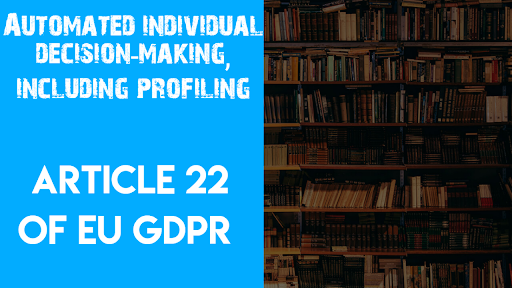Automated individual decision-making, including profiling
Article 22(1) of the EU General Data Protection Regulation (GDPR) outlines the right for individuals not to be subject to solely automated decisions, including profiling, which significantly affect them.
In simpler terms, this means that individuals have the right to request human intervention in the decision-making process when their personal data is used to make important decisions that can impact them. This article is intended to safeguard individuals from the potential negative outcomes of automated decision-making, such as unfair or biased decisions.
For example, let's consider a scenario where a bank uses an automated system to approve or decline loan applications. Article 22(1) of the GDPR ensures that individuals who have their loan applications rejected by the automated system have the right to request a human review of their application. This allows them to present any additional information or circumstances that the automated system may not have considered, providing a fair opportunity for their loan request to be reconsidered.
Moving on to Article 22(2)(a) of the GDPR, this section provides exceptions to the right outlined in Article 22(1). It states that automated decision-making can be used without human intervention if it is necessary for the performance of a contract between the individual and the data controller or if it is based on explicit consent.
To illustrate this provision, let's imagine an online retailer that uses automated systems to recommend products to customers based on their past purchase history. As long as the customer has provided their explicit consent for this automated decision-making, the retailer can continue to make product recommendations without human intervention. Similarly, if the customer has entered into a contract with the retailer that explicitly states that product recommendations will be made using automated systems, Article 22(2)(a) allows the retailer to utilize this technology without the need for human intervention.
Article 22(2)(b) of the GDPR highlights another exception to the right outlined in Article 22(1). It states that automated decision-making can occur without the requirement of human intervention if it is authorized by EU or Member State law, provided that appropriate safeguards are in place to protect the rights, freedoms, and legitimate interests of the individual.
For instance, a government agency may use an automated system to screen visa applications based on specific criteria set out in the law. As long as appropriate safeguards are in place to ensure the accuracy and fairness of the automated decision-making process, Article 22(2)(b) allows the government agency to proceed with this automated process without human intervention.
Lastly, Article 22(2)(c) of the GDPR addresses an exception related to automated decision-making that is necessary for entering into or performance of a contract between the data subject and a data controller. This means that if automated decision-making is necessary for the initial contract or during its execution, the data controller can proceed without human intervention.
For example, an online subscription service may use an automated system to determine the appropriate subscription plan for new customers based on specific parameters such as usage patterns and preferences. This automated decision-making process can occur without human intervention since it is necessary for the customer to enter into a contract with the subscription service and receive the desired benefits.
Moving onto Article 22(3) of the GDPR, this article requires data controllers to provide individuals with specific information about the logic involved in automated decision-making and the significance and consequences of such processing.
Suppose an e-commerce platform uses an automated system to determine the credit limit assigned to each customer. In compliance with Article 22(3), the platform needs to inform the customers about the key factors and reasoning behind these credit decisions, ensuring transparency and understanding of the automated process's impact.
Lastly, Article 22(4) of the GDPR allows individuals to contest decisions based solely on automated processes. This article grants individuals the right to request the review of decisions and express their point of view, regardless of whether human intervention was initially requested.
For instance, if a social media platform suspends a user's account based on automated algorithms detecting potential policy violations, the user can contest this decision and seek human review to present their viewpoint or address any potential errors made by the automated system, as provided by Article 22(4) of the GDPR.
In summary, these articles of the GDPR were established to protect individuals from the potential negative consequences of solely automated decision-making. They provide individuals with the right to human intervention in certain situations, exceptions allowing automated decision-making in specific cases, information transparency, and the ability to contest decisions made solely through automation.
Contact us for dpdp Compliance at lawyersera2023@gmail.com

Comments
Post a Comment